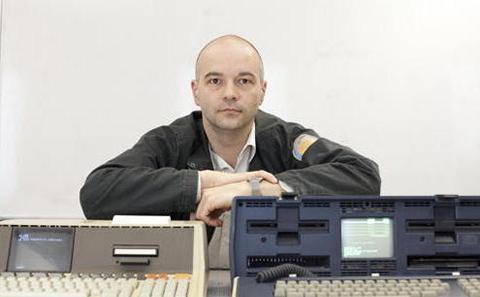ArtWare: A guest talk by Dr Stefan Höltgen Event

- Time:
- 15:00 - 17:00
- Date:
- 1 March 2019
- Venue:
- Winchester School of Art, PGR study room (ground floor, East Building)
For more information regarding this event, please email Professor Jussi Parikka at j.parikka@soton.ac.uk .
Event details
Welcome to a guest talk by Dr Stefan Höltgen from Humboldt University (Berlin). Höltgen’s talk will address some questions in re-enacting early computer arts and how this works both as a methodology and as part of teaching history of art and technology. The talk is free and open to attend.
ArtWare. Computer Archaeological Re-Enactments of Early Computer Arts.
Abstract:
In the autumn term 2018/2019, I was teaching the history, technology, and epistemology of the early cybernetic art (1960s/1970s) at the Humboldt University in Berlin (Media Studies) and the University of Greenwich in London (School of Design). The basic idea was to establish a more or less new method of teaching and researching media theory: the re-enactment, based on the original concept developed by the historian Robert Collingwood in the late 1940s and the ideas of experimental archaeology. By re-enacting hardware and software processes, it will be possible to not only get an insight into technological features that could not be seen on the surfaces of media but also to get an understanding of the “algorithmic thinking” of designers, artists, engineers, and media theorists. After starting with a close reading of the theories of rational aesthetics (Bense/Nees) and of media archaeological thinking about computer graphics (Kittler) we continued to study the specific mathematics, technologies (computers, peripherals), artworks, and algorithms of some cybernetic artists: Frieder Nake, Georg Nees, Herbert W. Franke, A. Michel Noll, Manfred Mohr, David Cohen and others. The acquisition of an easy-to-learn programming language and the re-programming of artworks with modern computers was the goal of this second half.
The talk will recapitulate the teaching processes in Berlin and London and will show some of the outcomes (re-enacted codes and artworks) of the students – compared with their originals. From this, I will derive the methodology of “radical media” and computer archaeology as Wolfgang Ernst has used the term. Methods like programming, soldering, tinkering, “carpentry” (Bogost) and other practices shall be discussed as a form of “making theory” and “media history criticism”.
Bio:
Dr Stefan Höltgen studied Linguistics, Philosophy, Social Sciences, and Media Studies from 1996 to 2000 in Jena (Germany). In 2009 he completed a dissertation in German Literature Studies at the University of Bonn. In 2011 he commenced a post-doc research project on “The Archaeology of Early Micro Computers and their Programming” at the Department for Musicology and Media Studies (Berlin Humboldt University) which is also his second dissertation at the Center for Computer Studies (Berlin Humboldt University). In 2015 he launched a book series on computer archaeology and joined the editorial staff of the magazine “Grundlagenstudien in Kybernetik and Geisteswissenschaft” (Fundamentals in Cybernetics and Humanities). He curates the “Media Archaeological Fundus”, the “Signal Laboratory”, the annual “Vintage Computing Festival Berlin”, and the workshop “Game Circuits” for operational computer game analysis.